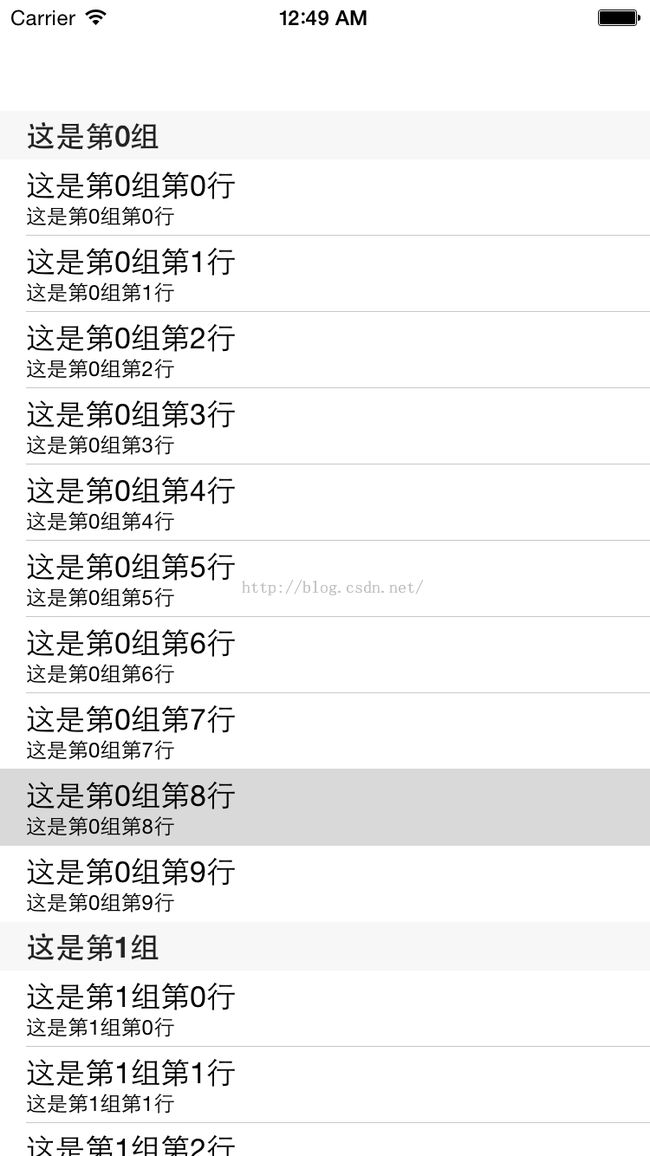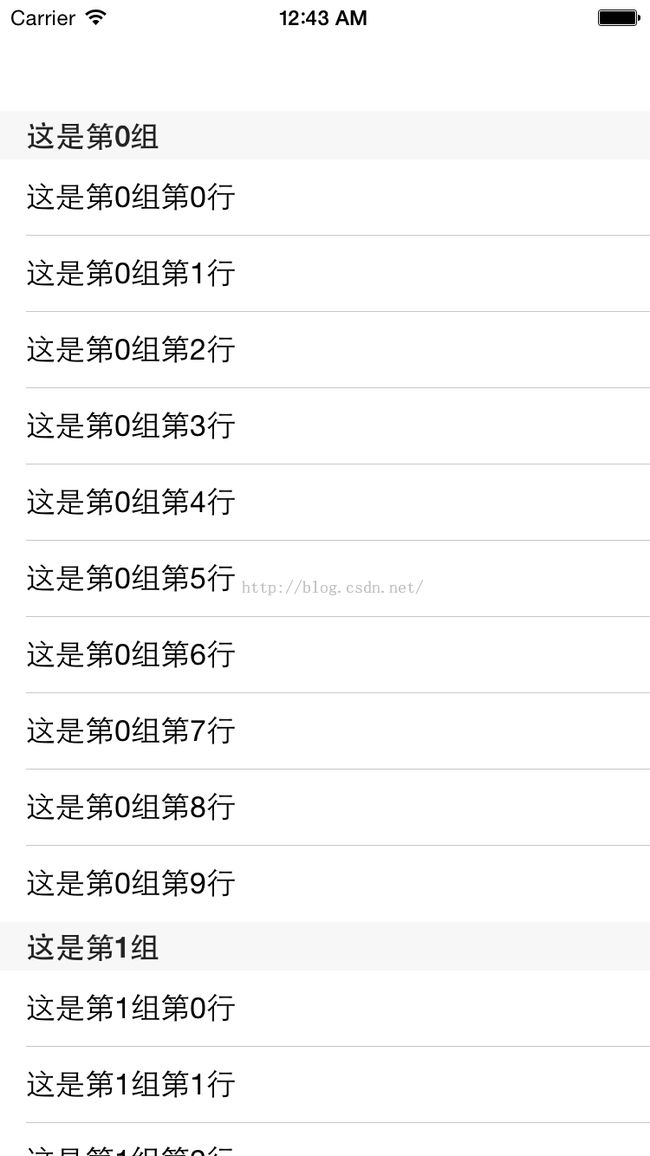iOS UITableView(二) 为tableView添加数据
//我们上一章创建了一个tableView我们来添加点数据吧
#import "ViewController.h"
//代理
@interface ViewController ()<UITableViewDelegate,UITableViewDataSource>
{
UITableView *_tableView;
//创建数据源数组
NSMutableArray *_dataArry;
}
@end
@implementation ViewController
- (void)viewDidLoad {
[super viewDidLoad];
[self creatData];
[self creatTableView];
}
//我们这里来设计一个二维数组
-(void)creatData{
_dataArry=[[NSMutableArray alloc]init];
for (int i = 0;i < 10; i ++ ) {
//创建一维数组存储每个分区的cell数据
NSMutableArray *arr=[[NSMutableArray alloc]init];
for (int j = 0; j < 10; j++) {
//存储每一行cell的数据,每一行的cell的数据模型
NSString *str =[NSString stringWithFormat:@"这是第%d组第%d行",i,j];
[arr addObject:str];
}
[_dataArry addObject:arr];
}
}
-(void)creatTableView{
//下面注释这句我们可以慢慢体会以后会给各位解答
// self.automaticallyAdjustsScrollViewInsets = NO;
//此处的UITableViewStylePlain,UITableViewStyleGrouped大家可以自己试验体会下
_tableView =[[UITableView alloc]initWithFrame:CGRectMake(0, 64, self.view.frame.size.width, self.view.frame.size.height) style:UITableViewStylePlain];
//设置数据源
_tableView.dataSource =self;
//设置代理
_tableView.delegate = self;
[self.view addSubview:_tableView];
}
#pragma mark - UITableViewDataSource协议
//设置有多少分区
-(NSInteger)numberOfSectionsInTableView:(UITableView *)tableView{
return _dataArry.count;
}
//每个分区有多少行
-(NSInteger)tableView:(UITableView *)tableView numberOfRowsInSection:(NSInteger)section{
return [_dataArry[section] count];
}
//获取cell 每次显示cell 之前都要调用这个方法
-(UITableViewCell *)tableView:(UITableView *)tableView cellForRowAtIndexPath:(NSIndexPath *)indexPath{
//创建复用标识符
static NSString *identifire = @"identifier";
UITableViewCell *cell =[tableView dequeueReusableCellWithIdentifier:identifire];
if (!cell) {//如果没有可以复用的
cell =[[UITableViewCell alloc]initWithStyle:UITableViewCellStyleDefault reuseIdentifier:identifire];
}
//填充cell 把数据模型中的存储数据 填充到cell中
cell.textLabel.text=_dataArry[indexPath.section][indexPath.row];
return cell;
}
//设置头标
-(NSString*)tableView:(UITableView *)tableView titleForHeaderInSection:(NSInteger)section{
return [NSString stringWithFormat:@"这是第%ld组",section];
}
- (void)didReceiveMemoryWarning {
[super didReceiveMemoryWarning];
// Dispose of any resources that can be recreated.
}
@end
//下面来看看效果吧
下面我们来认识一下cell的风格 上面的是第一种
// UITableViewCellStyleDefault,// Simple cell with text label and optional image view (behavior of UITableViewCell in iPhoneOS 2.x)
// UITableViewCellStyleValue1,// Left aligned label on left and right aligned label on right with blue text (Used in Settings)
// UITableViewCellStyleValue2,// Right aligned label on left with blue text and left aligned label on right (Used in Phone/Contacts)
// UITableViewCellStyleSubtitle// Left aligned label on top and left aligned label on bottom with gray text (Used in iPod).
- (UITableViewCell *)tableView:(UITableView *)tableView cellForRowAtIndexPath:(NSIndexPath *)indexPath {
//创建 复用标识符
static NSString *cellID = @"cellID";
//
UITableViewCell *cell = [tableView dequeueReusableCellWithIdentifier:cellID];
if (cell == nil) {//如果没有可复用的
cell = [[[UITableViewCell alloc] initWithStyle:UITableViewCellStyleSubtitle reuseIdentifier:cellID] autorelease];
}
//填充cell 把数据模型中的存储数据 填充到cell中
/*
//获取一维数组
NSArray *arr = _dataArr[indexPath.section];
f
*/
UserModel *model = _dataArr[indexPath.section][indexPath.row];
cell.imageView.image = [UIImage imageNamed:model.headName];
cell.textLabel.text = model.userName;
cell.detailTextLabel.text = model.phoneNumber;
return cell;
}

cell =[[UITableViewCell alloc]initWithStyle:UITableViewCellStyleValue1 reuseIdentifier:identifire];
cell =[[UITableViewCell alloc]initWithStyle:UITableViewCellStyleValue2 reuseIdentifier:identifire];

大家可以自己体会 明天决定多写 写一个类似电话薄的东西添加图片和编辑功能

